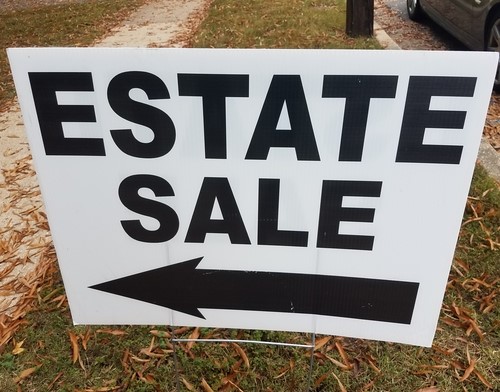An estate sale is the sale, liquidation, or auction of a person’s personal possessions after their death. Estate sales are commonly held in the deceased person’s home, and family members may be present. It can feel a little awkward entering a person’s home and buying their belongings, so it’s helpful to understand what an estate sale is and why someone would sell their property in one.
An estate sale is similar to garage or yard sales. In some cases, it may be set up like an auction. The proceeds from an estate sale may be used to pay for burial expenses and cover debts, such as nursing facility bills or other expenses. Sometimes, a person’s last will and testament specifies that they would like all their possessions sold in an estate sale and the proceeds divided among the beneficiaries. Selling the home and its contents can sometimes be the simplest way to liquidate an estate and distribute the income from the sale.
Why should you consider having an estate sale?
If a loved one has a lot of personal possessions, it can take a long time to sort through the items and decide which ones should be saved for a family member, which should be donated or sold through a consignment store, and which items should be discarded. Rather than dealing with this, many people just donate everything to charity and move on.
The problem with donating everything is that many items in an estate likely have financial or personal value. An estate sale provides everyone with the same opportunity to purchase items from the estate. By inviting the public into the deceased people’s homes, you have the potential to sell their entire estate contents all at one time.
Unlike a garage sale, often a large percentage of the items in an estate sale have significant value. Estate sales usually include appliances, furniture, jewelry, tools, and lawn care items for sale. This makes them popular with bargain-hunting consumers, and they can net a lot of money for the seller.
Who manages an estate sale?
Friends and family members of the deceased may manage an estate sale in much the same way that they would organize a garage or yard sale. Another option is to hire a third-party company to manage the sale.
Third-party sellers charge for their services, which can cut into profit, but they are experienced in pricing and presenting the property, which may lead to a higher profit. They can also save a lot of work and burden for the family.
A third-party seller can also be a good idea if beneficiaries disagree about how to sell more valuable items and how to divide the sale proceeds.
If you choose to manage an estate sale on your own, be sure to check with local and state tax authorities to ensure that you have all the necessary permits and documents to sell these items on behalf of the estate.
Another option is to hold an estate auction. In this case, the estate is categorized, packaged, and sent to an auction house. Instead of coming to the deceased person’s home, the public will attend the auction in an auction house, where they will bid on individual items.
One benefit of an auction is that each item goes to the highest bidder, which provides an opportunity to make more money from the estate. It also lets interested family members bid on highly desired items impartially, with the sale going to the highest bidder.
How much do estate sale companies charge?
According to the National Estate Sales Association, most estate sale companies charge a percentage of the sales’ gross profits, either a set percentage or a sliding scale ranging from 30% for high-value estates to 50% for smaller estates. If your estate contains many sought-after items, such as original artwork, designer jewelry, and extensive power tools, the estate seller may offer a lower percentage to win your business and outbid other companies.
How are estate sale items priced?
Pricing estate sale items can be challenging because you want to sell each item at its highest potential value, but if you price items too high, they will not sell. You will need to hold another estate sale or an auction, as well as donate or dispose of the unsold property.
If you are selling the deceased person’s property on your own, visit a few other estate sales or auctions to get an idea of pricing. Check online resale websites for pricing norms.
If you hire an estate sale company, they should be able to provide pricing advice based on local market conditions. If they are working for a percentage of sales, then they will be as motivated as you are to price each item at an optimal price.
Estate sales: Points to consider
Before hiring an estate sale company or hosting an estate sale on your own, ask others about their experiences. They may be able to provide a referral to a reputable estate sale company or share advice on how to manage an estate sale.
Before hiring an estate sale company, consider the following:
- Are they bonded and insured?
- Do they have references?
- Have you checked online reviews?
- How do they handle sales tax?
- How will they market your estate sale?
Before hosting an estate sale, consider the following:
- How will you inventory and organize all the items you want to sell?
- How will you regulate how many people can enter the home at once?
- How will you price items?
- Will you hire a professional to appraise valuable items?
- How will you handle security and prevent theft?
- Will you offer discounts on unsold items later in the day?
- Will family members be permitted to attend the sale?
- What payment options do you plan to offer?
Before deciding on a company, attend estate sales that your top choice companies are handling to get a sense of how they operate. Pay attention to how they price items. Check to see whether customers are encouraged to purchase items and that their questions are addressed.
Ask for references and call them to see if they are happy with the estate sale results. Do they have suggestions or advice on what they would do differently next time?
Create Your Estate Plan
As you consider your options and create your estate plan, consider whether an estate sale might work for your beneficiaries. Some families may be uncomfortable with publicly selling sentimental items. Others may consider an estate sale as an ideal way to liquidate their estate all at once.
There is no one-size-fits-all guide to estate planning. If you are interested in discussing your estate plan options, schedule a call with us at 855.631.3457 to learn more about how to protect those most important to you.








